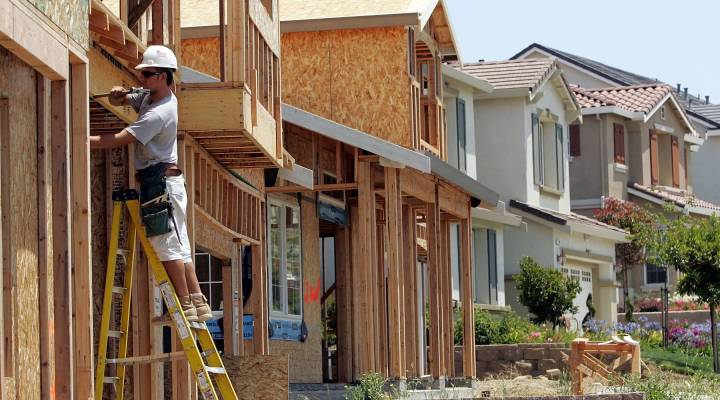
Homebuilding ends bad year on upswing
Share Now on:
Homebuilding ends bad year on upswing

Kai Ryssdal: The data out today from the U.S. housing market came in three varieties: The good, the bad and the ugly.
Seems easier to get the bad and the ugly out of the way first, so that’s where we’ll start — all rolled into one. Overall, 2011 was the worst year on record for single-family home construction.
The good comes in slightly less alarming form. Mortgage applications jumped 23 percent last week — so in theory, people do want to buy. Marketplace’s Stacey Vanek Smith has an update on the ever-confounding American housing market.
Stacey Vanek Smith: For the last half a century, the U.S. built an average of 1.5 million new homes every year. Last year, the U.S. built fewer than half that.
Still, Keith Gumbinger with mortgage website hsh.com describes the 2011 housing market as:
Keith Gumbinger: Warming, not warm by any means, but warming. And that’s going to start us out in 2012 in a much better position.
And the fact fewer homes are being built is a good thing, says Wharton’s Susan Wachter. She says there’s a glut of empty homes and we don’t need new ones. And she sees reasons to be optimistic about the overall market.
Susan Wachter: Housing has never been more affordable, mortgage rates are at all-time lows, we have job growth, albeit slow. The problem is that shadow supply that’s out there.
That shadow supply. You can think of it as the ghost of foreclosures past.
Georgetown Univeritsy’s Adam Levitin explains.
Adam Levitin: Properties where foreclosures have been started, but maybe not completed. And there’s a real backlog in the foreclosure process for a few reasons.
One is the states. Many require judges to approve foreclosures and courts are backed up. The other problem, says Levitin: Allegations that banks illegally foreclosed on people. Those had banks stopping everything to get their paperwork in order.
Levitin: You can kind of think of this as the pig stuck in the python. The pig is going to work its way out of the python, but it’s taking a while.
It’s a big pig. It’s estimated more than a million homes are sitting in the shadows. Levitin says it could take another year or two to exorcise the demons of the housing crash and, until we do, no recovery is safe.
In New York, I’m Stacey Vanek Smith for Marketplace.
There’s a lot happening in the world. Through it all, Marketplace is here for you.
You rely on Marketplace to break down the world’s events and tell you how it affects you in a fact-based, approachable way. We rely on your financial support to keep making that possible.
Your donation today powers the independent journalism that you rely on. For just $5/month, you can help sustain Marketplace so we can keep reporting on the things that matter to you.


















